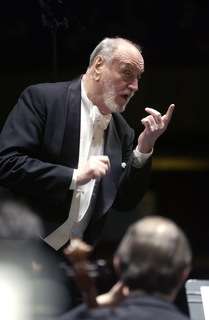|
Back
Masur finds rejuvenation in two Symphonies No. 4 Zurich
Tonhalle
06/09/2009 - & June 10, 11
Felix Mendelssohn: Symphony No. 4 “Italian”
Anton Bruckner: Symphony No. 4 “Romantic”
Tonhalle Orchestra, Kurt Masur (conductor) 
Kurt Masur (© Radio France/ Christophe Abramovitz)
Three decades have passed since the last time Masur conducted the Tonhalle, that was in December 1979. Then, too, he opened his performance with Mendelssohn’s Italian symphony. His connections with Mendelssohn are close. Masur, a Saxon by birth, was Kapellmeister in Leipzig for 25 years, a successor in the post of Mendelssohn. Masur has recently had the Mendelssohn family flat in Leipzig renovated and small concerts are now played there.
Mendelssohn conceived his Italian symphony during a journey through Europe (Italy, France, England and Scotland) in 1831 which lasted 18 months. He later described his Fourth symphony as the jolliest piece he had written.
The piece itself has in fact no Italian overtones, nor can one detect any Italian folk elements; it was simply a musical reflection of his clearly enjoyable journey (his depression came later on his return when he had to set his memories to music). What makes the symphony special? The urgent immediate opening, the third movement a Minuet, not a Beethovian scherzo, and the last movement a Saltarello (literally a small skip) which is even racier than the opening Allegro vivace .
The joyous strings scampered deliciously through the opening Allegro of the Mendelssohn. Each movement brought a kiss to the orchestra from Masur and smiles on all the orchestra’s players. The audience was equally enraptured. Masur zipped through the final Saltarello at breakneck speed and drove the orchestra hard to full effect. Tributes at the end went to the principal horn, who also rose to the occasion in the work after the interval, Bruckner’s Fourth Symphony.
The Bruckner gave the brass the chance to shine in all four movements and shine they did. Masur kept a very even steady pulse in the opening monumental movement and thankfully made no attempt whatsoever to pull the tempi in any direction. Variety came with changes of dynamics from extreme hush to ear-shattering climaxes, the end of the Coda particularly building up momentum to its final blaze of glory.
The Andante based on simple rondo form, brought welcome repose, fine playing from mournful cellos, but tranquillity did last not long, as the brass once again, over steady strings, sang out the powerful hymn-like ending.
The jovial hunting calls from the fine and lip-fault-free horn section framed the central trio section of the Scherzo, a "Ländler", which could perhaps have benefited from some more charm and sway.
The Finale, "bewegt aber nicht zu schnell", was majestic, blocks of raw sound with intervals of virtual silence in between which brought Rothko’s art to mind not Felix Mendelssohn’s delicate watercolours. The woodwind section needed their earplugs at regular intervals.
Masur at 82 needs no chair, or corset, or help to get either on or off the stage, no scores, no baton. His expressive hand movements tell his players all they need to know, each entry, each dynamic shading, each accentuation. Tempi in both works were always perfectly judged.
The works he chose for this evening’s performance are works he knows, of course, like the back of those hands, works he has conducted for decades with the world’s top orchestras, and it showed. The music-making was of the highest quality throughout, the Tonhalle orchestra were energised, played with utter commitment, and were clearly thrilled to be playing for one of the last remaining great names.
At the end, the audience jumped to their feet. Most conductors look worn out after performing two great symphonies; Masur had made the conducting look effortless and looked fresh as a daisy. He winked at the players, waved at the cheering audience and appeared to have found rejuvenation.
John Rhodes
|